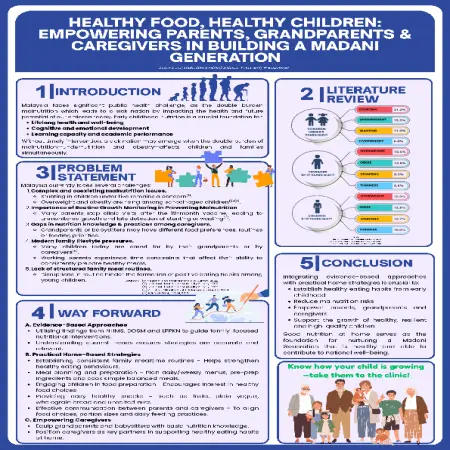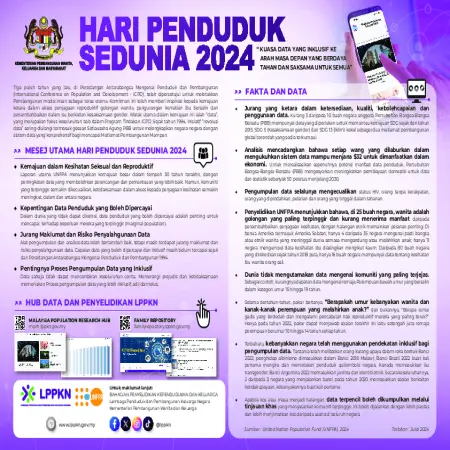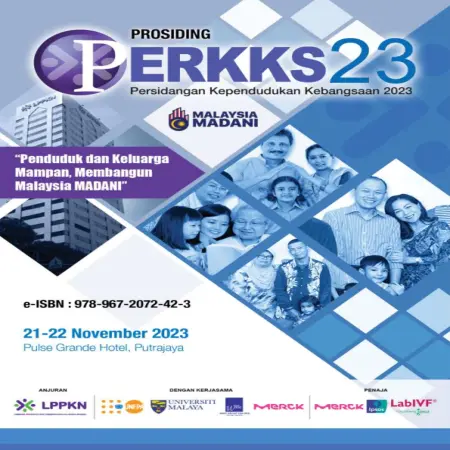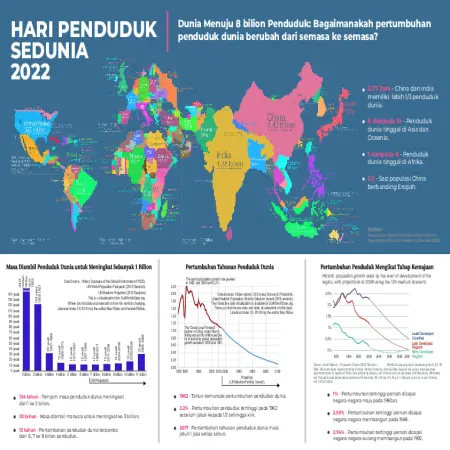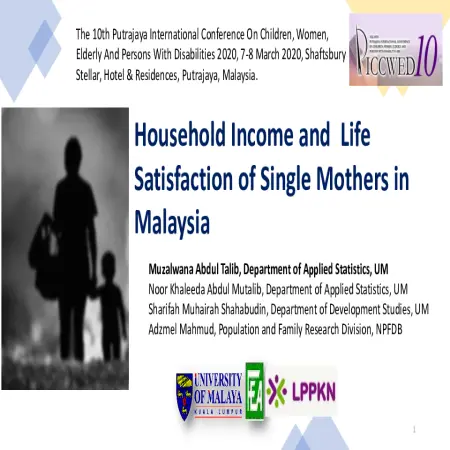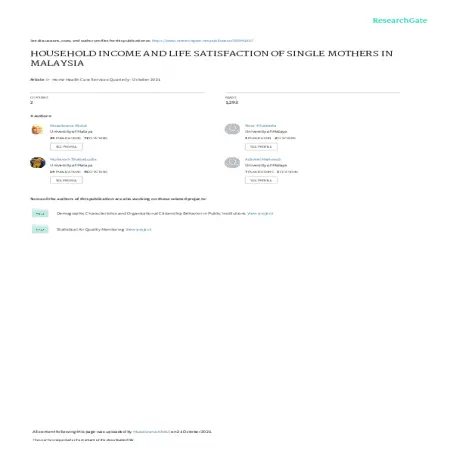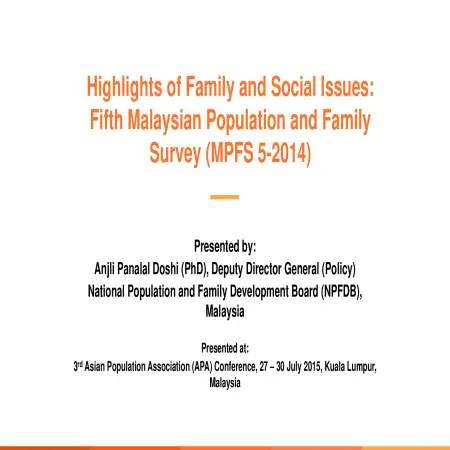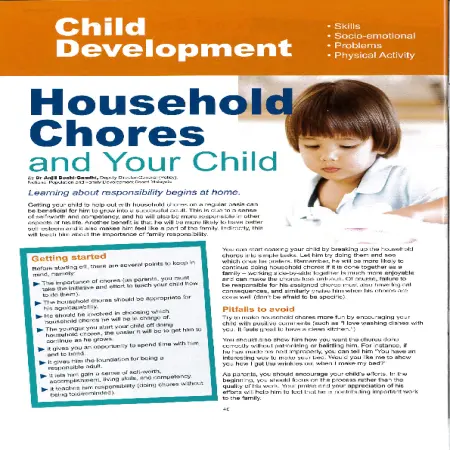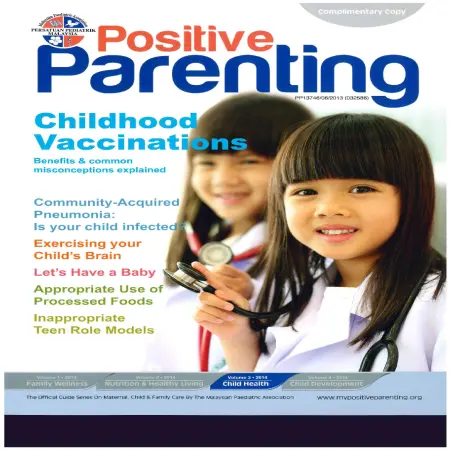PUBLICATIONS
|
|
Healthy food, healthy children: empowering parents, grandparents & caregivers in building a madani generation
Item Type: Scientific Poster
Editor:
Year: 00/11/2025
Abstract: Malaysia faces significant public health challenge, as the double burden malnutrition which leads to a sick nation by impacting the health and future potential of our children today. Early childhood nutrition is a crucial foundation for lifelong health and well-being; cognitive and emotional development; and learning capacity and academic performance. Without timely intervension, a sick nation may emerge when the double burden of malnutrition- undernutrition and obesity-affects children and families simultaneously. Conclusion, good nutrition at home serves as the foundation for nurturing a Madani Generation that is healthy and able to contribute to national well-being.
|
|
|
|
|
|
Hari Penduduk Sedunia 2024 : “kuasa data yang inklusif ke arah masa depan yang berdaya tahan dan saksama untuk semua”
Item Type: Infographic
Editor:
Year: 00/07/2024
Abstract: Since 1994, the "data revolution" initiative has often been repeated including the UN Secretary General's call to equip countries with comprehensive data systems to achieve sustainable development goals. The main messages of World Population Day 2024 are progress in sexual and reproductive health, the importance of reliable population data, information gaps and the risk of data misuse, and the importance of inclusive data collection processes.
|
|
|
|
|
|
Hubungkait antara cara gaya keibubapaan dan jenis trauma kanak-kanak dalam kalangan pelajar universiti di Malaysia
Item Type: Book Section
Editor:
Year: 00/12/2023
Abstract: According to the Social Welfare Department, children in need of care and protection according to Section 17[1][a] were injured and there were found a total of 2,074 cases recorded in 2020 and increased to 2,239 cases in 2021. Most cases occur in family institutions where children are under the care of a parent or guardian. Through this study, in addition to identifying the pattern of parenting styles in Malaysia and the status of childhood trauma level from the perspective of adolescent perception, the correlation between the two aspects was also studied.
|
|
|
|
|
|
Household income and life satisfaction of single mothers in Malaysia
Item Type: Conference or Workshop Item
Editor:
Year: 00/03/2020
Abstract: This study attempts to explore the socio –demographic and economic background of single mothers in Malaysia and to examine their income category and level of poverty. This study utilizes the Fifth Malaysian Population Survey (MPFS5) data. However, for this study, the target respondents are working single mothers (either widowed, divorced, separated); aged 15- 59 years old; residing in Peninsular Malaysia and have children staying together with them. Findings from this study reveal that household income of single mothers falls under the B40 category but there is not enough evidence to claim that their household income is below the poverty line. Chi – Square test of associations prove relationships between poverty level to socio – demographic variables such as level of education and residential states, while PLS – SEM techniques show that income category of single mothers is somehow related to the predictors of life satisfaction construct and the overall life satisfaction. Single mothers are already facing limited job market and reduced salary with their low level of educational attainment. Therefore, some suggested policy recommendations are to protect and promote single mothers involved in elementary occupations and to create more quality jobs to develop these women from the existing low-paid of the informal into the formal sectors.
|
|
|
|
|
|
Household income and life satisfaction of single mothers in Malaysia
Item Type: Article
Editor:
Year: 00/01/2020
Abstract: Single parenting is not an uncommon family setting in Malaysia. Past studies, however, tend to confirm that increasing number of single mothers is also related to increasing number of households living in poverty. Issues on single mothers in Malaysia has initiated many social groups, non-governmental organizations and government agencies to step in eradicating poverty among the single mothers especially those fall in the B40 income groups. Until today, the current information available on single mothers in Malaysia is still limited. This study attempts to explore the socio – demographic and economic background of single mothers in Malaysia and to examine their income category and level of poverty. This study utilizes the Fifth Malaysian Population Survey (MPFS5) data. MPFS5 is a nationally representative large-scale research conducted by the National Population and Family Development (NPFDB) in 2014. However, for this study, the target respondents are working single mothers (either widowed, divorced, separated); aged 15 – 59 years old; residing in Peninsular Malaysia and have children staying together with them. Findings from this study reveal that household income of single mothers falls under the B40 category but there is not enough evidence to claim that their household income is below the poverty line. Chi – Square test of associations prove relationships between poverty level to socio – demographic variables such as level of education and residential states, while PLS – SEM techniques show that income category of single mothers is somehow related to the predictors of life satisfaction construct and the overall life satisfaction. Suggestions for some policy recommendations to protect and promote single mothers within the informal sectors is also presented.
|
|
|
|
|
|
Household income and life satisfaction of single mothers in Malaysia
Item Type: Article
Editor:
Year: 00/01/2020
Abstract: Single parenting is not uncommon family setting in Malaysia. Past studies, however, tend to confirm that increasing number of single mothers is also related to increasing number of households living in property. Issues on single mothers in Malaysia has initiated many social groups, non-governmental organizations and government agencies to step in eradicating poverty among the single mothers especially those fall in the B40 income groups. Until today, the current information available on single mothers in Malaysia and to examine their income category and level of poverty. This study utilizes the Fifth Malaysian Population Survey (MPFS5) data. MPFS5 is nationally representative large-scale research conducted by the National Population and Family Development (NPFDB) in 2014. However, for this study, the target respondents are working single mothers (either widowed, divorced, separated); aged 15-59 years old; residing in Peninsular Malaysia and have children staying together with them. Findings from this study reveal that household income of single mothers falls under the B40 category but there is not enough evidence to claim that their household income is below the poverty line. Chi-Square test of associations prove relationship between poverty level to socio – demographic variables such as level of education and residential states, while PLS-SEM techniques show that income category of single mothers is somehow related to the predictors of life satisfaction construct and the overall life satisfaction. Suggestions for some policy recommendations to protect and promote single mothers within the informal sectors is also presented.
|
|
|
|
|
|
Highlights of family and social issues : Fifth Malaysian Population and Family Survey (MPFS 5-2014)
Item Type: Conference or Workshop Item
Editor:
Year: 00/00/2015
Abstract: This slide Highlights of Family and Social Issues from finding of the Fifth Malaysian Population and Family Survey (MPFS 5-2014).
|
|
|
|
|
|
Household chores and your child
Item Type: Article
Editor:
Year: 00/00/2015
Abstract: Getting your child to help out with household chores on a regular basis can be beneficial for him to grow into a successful adult. This is due to a sense of self-worth and competency, and he will also be more responsible in other aspects of his life. Another benefit is that he will be more likely to have better self-esteem and it also makes him feel like a part of the family.Indirectly, this will teach him about the importance of family responsibility.
|
|
|
|
|
|
Hassle free travel with your kids
Item Type: Article
Editor:
Year: 00/00/2014
Abstract: Pick a destination with something for everyone to enjoy. A tour may seem like an easy way to see everything, but take it easy and don’t pack your tour schedule with too many activities especially if you have babies and toddlers with you. The key is to remain flexible.
|
|
|
|





